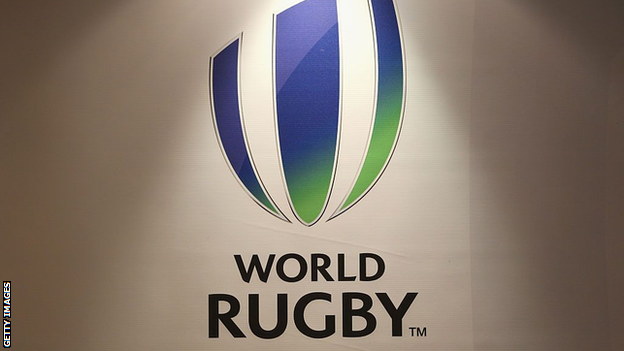World Rugby says transgender women cannot compete in women's elite contact rugby
- Published

World Rugby's review concluded a "balance between safety, fairness and inclusion" could not be provided for transgender women playing women's contact rugby
World Rugby has become the first international sports federation to say transgender women cannot compete at the elite and international level of the women's game.
New guidelines published on Friday "do not recommend" transgender women play contact rugby "on safety grounds".
However, national unions can be flexible in their application of the guidelines at community level.
Transgender men remain permitted to play men's contact rugby.
It follows a "comprehensive, collaborative and inclusive review" of World Rugby's existing guidance.
In a statement, World Rugby said the review concluded "safety and fairness cannot presently be assured for women competing against transwomen in contact rugby".
It added it was committed to "regularly reviewing the guidance to monitor and consider any new evidence or research".
"This has been a complex and emotive process, but a necessary one," said Dr Araba Chintoh, who chaired the review.
"We set out to determine whether it would be possible to maintain inclusion in contact rugby based on the available research and evidence and rugby's unique context of combining strength, power, speed and endurance in a physical, collision environment.
"As we progressed through a comprehensive and inclusive review, it became clear there are compelling evidenced safety considerations which we simply cannot ignore.
"Unions will be able to exercise flexibility on a case-by-case basis at the community level of the game, for which the unions are responsible, while World Rugby will continue to prioritise inclusion strategies to ensure that the trans community remain an active, welcome and important member of the rugby family."
World Rugby chairman Sir Bill Beaumont added: "Rugby is a welcoming and inclusive sport and, while this has been a difficult decision to make, it has been taken following comprehensive consultation and engagement and for the right reasons, given the risk of injury.
"That said, we recognise that the science continues to evolve, and we are committed to regularly reviewing these guidelines, always seeking to be inclusive."
World Rugby's previous transgender policy follows the International Olympic Committee's (IOC) policy, which states transgender women must suppress testosterone levels for at least 12 months before competition.
Testosterone is a hormone that increases muscle mass.
The IOC is currently developing new guidelines.